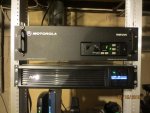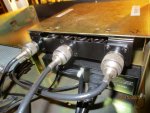Hello to all and thanks for taking the time to read this!
I have recently purchased a Motorola RKR1225 repeater and had it pre programmed for GMRS. It did not come with a duplexer, so I purchased one of the 6 cavity 50 watt Chinese ebay duplexers and had the seller tune it to my high/low frequencies. I am using an Optek UH2401 6.5 DB gain antenna about 25 feet off the ground on a chimney mount.
Here's the issue I am having
After testing, I am only getting a spotty 3 mile radius of range. I have used a Jetstream UHF SWR meter and got the SWR down to 1.2. The repeater has been turned down to 25 watts. I hooked the meter to test everything after the duplexer and the SWR is still the same but the power dropped down to 15 watts. If I bypass the duplexer, the wattage goes back up to 25 watts. I have switched the jumper cable around with the same results.
Sorry for the long post but to sum it all up, I believe I have a problem being that the duplexer is dropping my wattage from 25 watts to 15 watts and the repeater only works about a 3 mile radius hit or miss. If I use my mobile radio in my vehicle, I can hit it maybe 5 miles away but really shifty.
Any feed back or ideas would be appreciated.
Thanks in advance
I have recently purchased a Motorola RKR1225 repeater and had it pre programmed for GMRS. It did not come with a duplexer, so I purchased one of the 6 cavity 50 watt Chinese ebay duplexers and had the seller tune it to my high/low frequencies. I am using an Optek UH2401 6.5 DB gain antenna about 25 feet off the ground on a chimney mount.
Here's the issue I am having
After testing, I am only getting a spotty 3 mile radius of range. I have used a Jetstream UHF SWR meter and got the SWR down to 1.2. The repeater has been turned down to 25 watts. I hooked the meter to test everything after the duplexer and the SWR is still the same but the power dropped down to 15 watts. If I bypass the duplexer, the wattage goes back up to 25 watts. I have switched the jumper cable around with the same results.
Sorry for the long post but to sum it all up, I believe I have a problem being that the duplexer is dropping my wattage from 25 watts to 15 watts and the repeater only works about a 3 mile radius hit or miss. If I use my mobile radio in my vehicle, I can hit it maybe 5 miles away but really shifty.
Any feed back or ideas would be appreciated.
Thanks in advance




